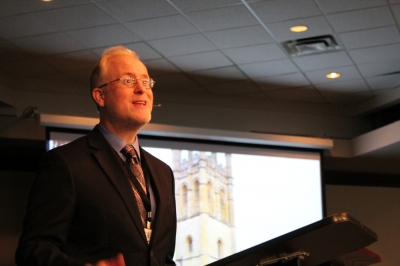United Methodist Church Bans Intelligent Design Group From General Conference

The United Methodist Church has rejected an Intelligent Design group's request to have an information table at the denomination's 2016 General Conference.
Reaffirming a decision from December, the UMC's Commission on the General Conference decided last week to not allow the Seattle-based Discovery Institute an information table at the Mainline Protestant denomination's gathering in Portland, Oregon.
Diane Degnan, spokeswoman for the UMC, told The Christian Post that this was the first General Conference to allow for "outside exhibitors."
"The Commission on the General Conference determined that the application by the Discovery Institute did not meet the guidelines established for exhibitors in that it was not consistent with the purpose of the exhibitor program," said Degnan.

"[The program] states that exhibits are not to provide a platform to survey or test ideas but to provide products, services and resources which are credible and proven to help local church ministries), and, in their opinion, it conflicted with our social principles."
United Methodism's official position on the Creation vs. evolution debate has been decidedly in favor of evolution, with their website offering links to works calling on Christians to embrace the theory.
In 2008, the UMC passed a resolution voicing opposition to any efforts to have ideas like Intelligent Design or Young Earth Creationism included in public education.
"… the General Conference of The United Methodist Church [goes] on record as opposing the introduction of any faith-based theories such as Creationism or Intelligent Design into the science curriculum of our public schools," read the resolution.
Last October the Discovery Institute inquired the UMC about having an information table at General Conference.
John G. West, vice president of the Discovery Institute, told CP about the reasons for wanting an exhibit table at General Conference.
"We are a nonprofit educational and research organization, and we have sponsored information tables at a wide variety of conferences and events," explained West.
"A staff member or ours who is a United Methodist brought to our attention the fact that the United Methodist General Conference would be held this year in Portland, Oregon, which is just a few hours away from our headquarters in Seattle."
Last December, the Commission denied the Institute's application and last Thursday reaffirmed the decision, reportedly referencing the 2008 resolution to justify their reasoning.
West told CP that he believed this reasoning was "ridiculous," since his organization "does not favor introducing Intelligent Design into public school science classes" but rather thinks "students should learn about the scientific strengths and weaknesses of modern Darwinian theory."
"More importantly, our information table was not focused on public school policy, but about resources dealing with science and faith; and nothing in the resolution they cited said United Methodists couldn't believe in Intelligent Design or discuss it," continued West.
"I would point out that the UMC's slogan is 'open hearts, open minds, open doors,' and UMC leaders claim to be in favor of open dialogue. But banning us from even having an information table is not open-minded. It's close-minded in the extreme."





















